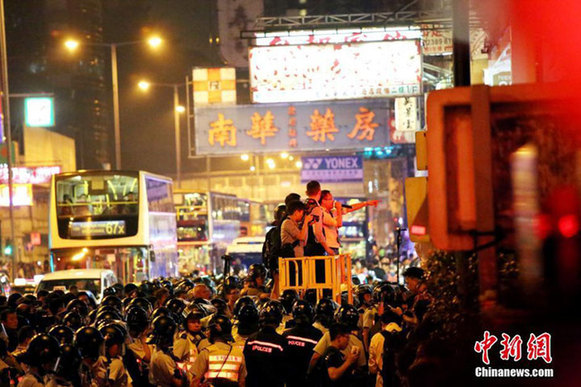Britain's changed relationship with China
- By John Ross
 0 Comment(s)
0 Comment(s) Print
Print E-mail China.org.cn, December 5, 2014
E-mail China.org.cn, December 5, 2014
Few things better illustrate the changed relationship between China and Great Britain than the Chinese government's refusal to allow United Kingdom MPs to visit Hong Kong in order to "investigate" the Occupy movement and the 2017 election for chief executive. This decision led to the U.K. Parliament holding an "emergency" debate on the matter in early December.
|
|
|
Confrontations between Hong Kong's riot police forces and 'Occupy Central' protestors take place again at Mong Kok late on November 28, 2014. [Photo: Chinanews.com] |
In the 19th or early 20th century, the dispatch of a gunboat or military expedition would probably have followed such a U.K. parliamentary debate, as China learned to its bloody cost several times. In 2014, the debate merely led to the British Parliament letting off hot air.
The overall results of the proposed action and debate will probably damage the U.K. For two years after British Prime Minister David Cameron met with Tibetan separatist leader the Dalai Lama, China refused to allow any high-ranking British minister to visit. Only after the British government stopped such behavior because it urgently wanted to strengthen ties with China's rapidly growing economy was Cameron allowed to carry out this year's successful visit to Beijing. Damage to the U.K. this time may or may not be lessened by the fact that the Speaker of the House of Commons, the MP who calls such emergency debates, is not a member of any governing party.
China was justified in banning U.K. MPs from this visit. The 2017 Hong Kong election of a chief executive is China's internal affair. The "one country, two systems" governance that was agreed upon as part of Hong Kong's 1997 return to China means Hong Kong is subject to China's laws and to the decisions of the National People's Congress (NPC). The NPC's decision on the 2017 election clearly fulfils China's international obligations, as Lord Powell, the private secretary to Thatcher during negotiations on Hong Kong, has affirmed.
If the NPC had decided to visit Britain during the recent referendum on Scottish Independence or during the 2011 riots in London as a way of propagandizing its opinion on whether Scotland should be independent or to investigate "police repression of ethnic minorities" during the riots, this would have been seen as interference in Britain's internal affairs.







Go to Forum >>0 Comment(s)